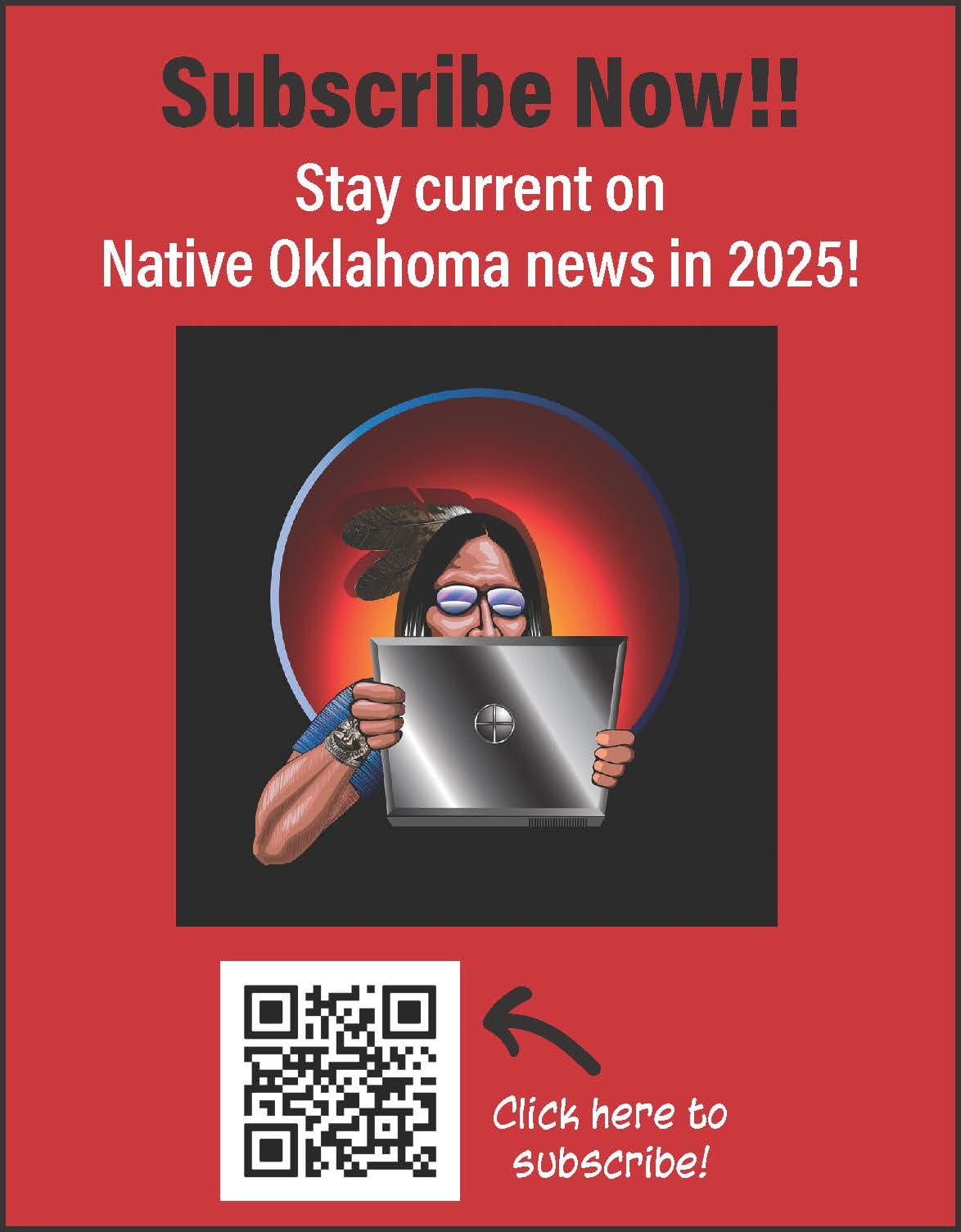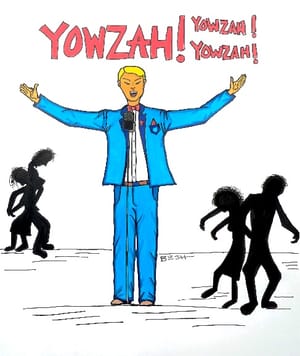

Native Oklahoma Magazine Expands Reach and Impact with new Native Oklahoma News Show Featured on KOKL (The Brew)-Okmulgee, OK
Native Oklahoma News, a newly formed independent media outlet, is set to launch a groundbreaking news program this November 2025, delivering credible journalism relevant to all Native Americans in Oklahoma, regardless of tribal membership.
The organization continues to grow its audience, now reaching an average of 30,000 page views per month. Across web and social media platforms, Native Oklahoma News boasts a combined subscriber base of 65,000 followers.
In Okmulgee, KOKL (The Brew) serves as a cornerstone of local media, broadcasting on 1240 AM and 106.3 FM with a classic hits format from the '60s, '70s, and '80s. The station also offers community-focused programming, including:
- Tradio: A live call-in show weekdays from 9:00 AM to 10:00 AM, allowing listeners to buy, sell, and trade items.
- BREWtv Sports: Coverage of local high school sports events.
- Brewer's Briefing Podcast: A podcast discussing local news and events.
- Digital Marketing Solutions: Services helping local businesses enhance their online presence.
With more than 500,000 Native Americans from 39 federally recognized tribes living in Oklahoma, Native Oklahoma News addresses a critical gap: while many tribes maintain individual outlets, no statewide program exists to unify and reflect the collective Native experience.
The program will feature:
- Weekly 30-minute radio show distributed across digital platforms.
- Weekly impactful topics such as:
- Tribal & State political news
- Tribal Community social news
- Tribal Economic Development stories
- Local Tribal business feature stories
- Culture & Entertainment feature stories
- Content produced by Native journalists, ensuring authentic perspectives and inclusive storytelling.
“Native Oklahoma News was created to give all Native people in Oklahoma—no matter their tribal affiliation—a trusted, unified source of news and analysis,” said founder Adam Proctor. “This is more than journalism—it’s about reclaiming our narrative, promoting equity, and strengthening the awareness of Indigenous voices across Oklahoma and beyond.”
Built on values of transparency, trust, credibility, inclusiveness, and respect, Native Oklahoma News empowers Native voices, protects the integrity of Native narratives, and showcases Oklahoma’s diverse Native cultures on both state and global platforms.
To support the show or request your story to be featured, contact:
Adam Proctor: Founder | Editor-in-Chief
918.409.7252,adam@nativeoklahoma.us
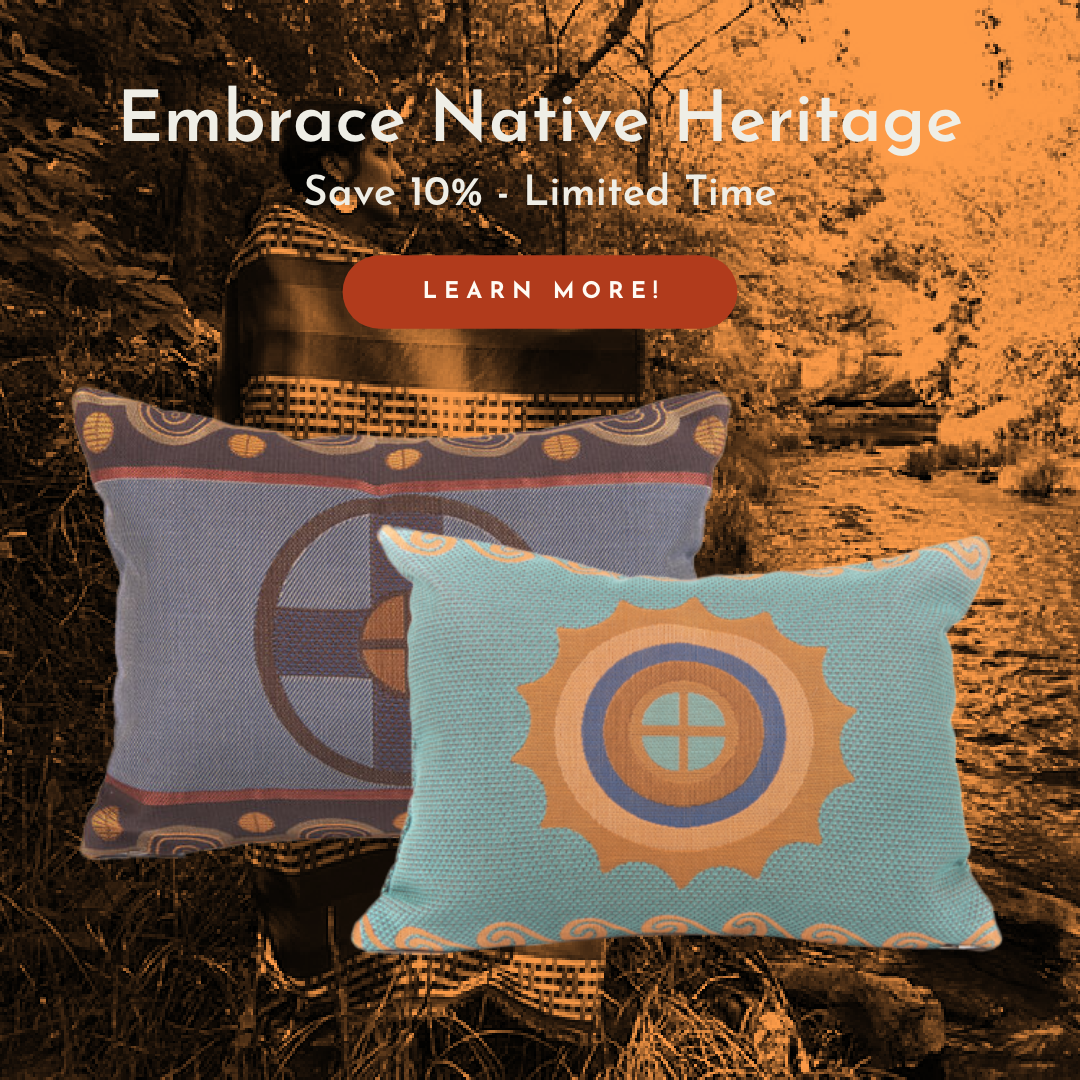
No Kings protesters make voices heard across the nation
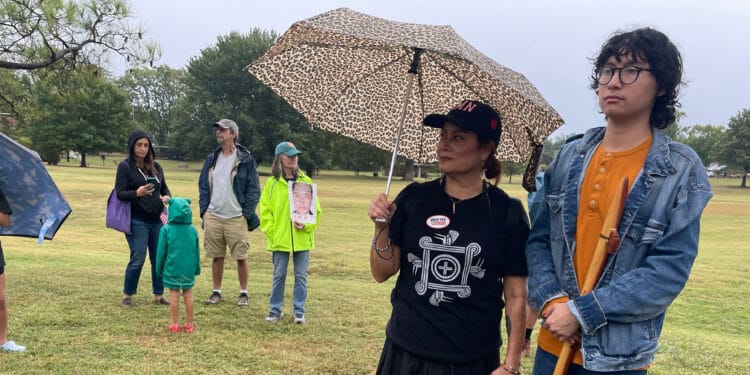
Mvskoke citizens at the Dream Keepers Park demonstration shared their concerns on the Trump administration’s foreign and domestic policies and Tribal sovereignty
“I think it’s an important duty for me and a conviction for me to be here (Dream Keepers Park) today. I was at the first No Kings protest in June. It was really important for me to stand up and be present among other people here who are fighting for their rights as citizens.” – Elise Berryhill-Taylor
by Braden Harper, Mvskoke Media
TULSA – Pouring showers may have smeared the colorful signs of protestors at the No Kings Protest at Dream Keepers Park in Tulsa on Oct. 18, however it could not dampen their spirits nor their message: America is not a monarchy. Undeterred by the rain, hundreds of protestors lined South Boulder Avenue and West 21st Street. The demonstration was one of an estimated 2,700 organized across the United States with an estimated 7 million demonstrators in attendance.
Another demonstration was held at 71st and Memorial in south Tulsa. Demonstrations in municipalities across Indian Country in Oklahoma included Muskogee, Tahlequah, and Ada. At Tulsa’s downtown protest, Mvskoke citizens Elise Berryhill-Taylor and her son, Thomas Taylor, were present to support the movement and express their concerns regarding policies and actions made by the Trump administration.
This is not the first demonstration Berryhill-Taylor has attended. She also attended the first No Kings Protest held on June 14. Weather conditions for last spring’s protest also saw cloudy skies and showers. In spite of the wet conditions, Berryhill-Taylor described her support as a “duty” to stand up for her rights as a dual citizen.
“I’m really concerned about our (United States) constitution continuing to be diminished and destroyed. I felt like it was my duty as a United States citizen and as a Tribal citizen, Indigenous to this land to stand up and be represented and counted. Rain or shine, I was not going to be deterred from it.”
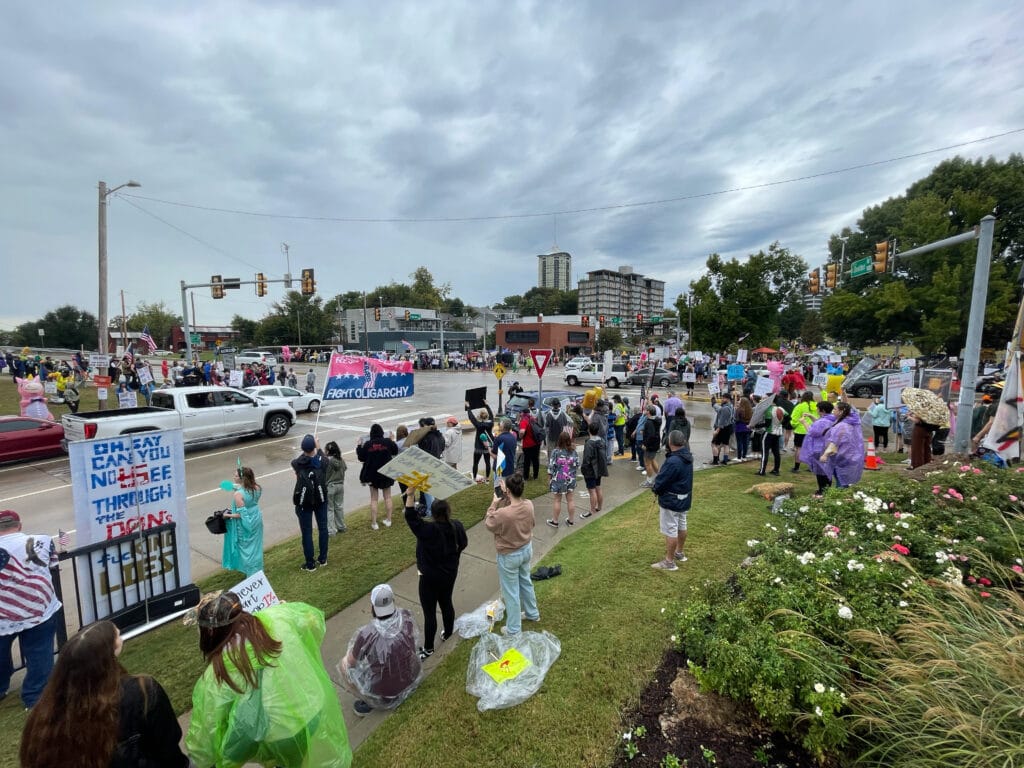
Taylor has grown disillusioned with the Trump administration. He described the administration as a “dictatorship” and does not feel safe as a citizen. Taylor was drawn to protest because he felt like he could no longer stay silent on these issues.
“Trump has been known to be a pathological liar. Lying about 2020, securing our rights, staying true to the constitution. Everything he’s done, everything he’s said has gone against that. This is a call for action,” Taylor said.
Both Taylor-Berryhill and Taylor believe that Tribal sovereignty under the current administration is at risk. They are both members of Oce Vpofv, Hickory Ground, the Ceremonial Ground that continues to fight against injustices carried out against them by the Poarch Creek Indians.
“Sovereignty has been under attack since our very existence,” Berryhill-Taylor said. “It’s harder now to fight for sovereignty because all of our rights are being taken away. This administration does not recognize Tribal people at all. It’s going to continue to be harder to gain ground and fight for our right to exist, our lands, our right to resources, food sovereignty and every aspect of our culture. That includes our language, our DNA, and ancestral lands like Hickory Ground.”
Both the June 14 and Oct. 18 demonstrations were described as a “festive, hopeful atmosphere” by Taylor-Berryhill. She especially found it inspiring to see like-minded members of the community come together in a red state like Oklahoma. Although Taylor-Berryhill and Taylor agree that the issues they are protesting will not be fixed overnight, they also believe that unity inspires hope during uncertain times.
“If we can come together and be a light in these dark times it can bring some hope for a better future,” Taylor said. “We can’t fix every problem but we know how to be there for each other. As long as we can speak about it, there is light at the end of the tunnel.”
Caddo, Texas leaders reach agreement to protect tribal nation's ancestral sites
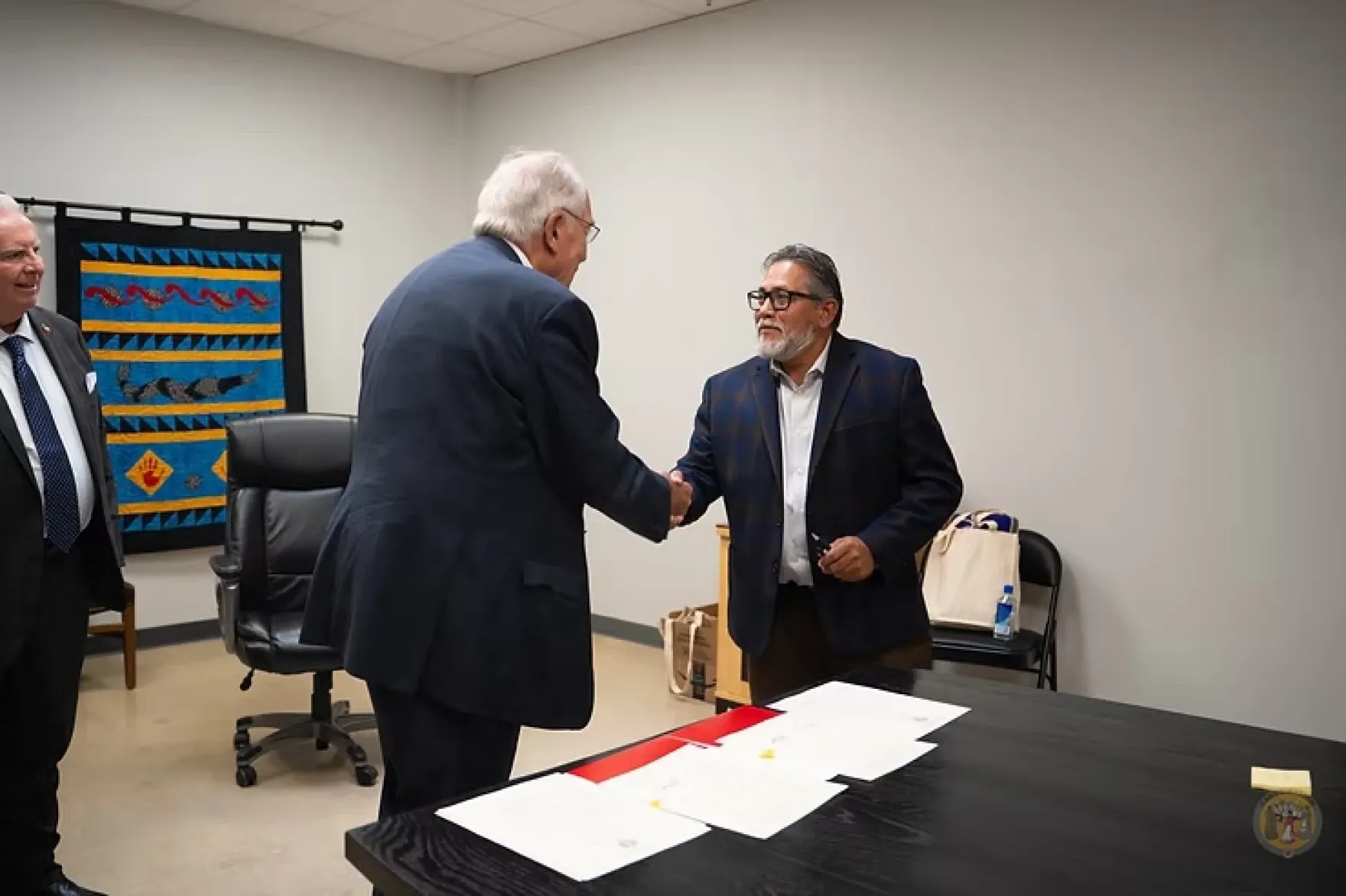
The Caddo Nation signed an agreement with the Texas Historical Commission last month, ensuring the tribal nation has a seat at the table when making decisions about its historic sites.
By Sarah Liese (Twilla), KOSU
At the heart of the agreement is the goal to protect the Caddo Mounds State Historic Site in Alto, Texas, where a Caddo village and ceremonial center used to reside more than 1,200 years ago. Three earthen mounds still remain in the east Texas area.
Caddo Nation Chairman Bobby Gonzalez called the memorandum of understanding (MOU) between state and tribal leaders a win-win, which he said took years in the making — beginning when he took office.
"The MOU is a vital step in honoring and protecting the heritage of the Caddo people," Gonzalez said in a statement. "These lands and resources are a living connection to our ancestors, and this partnership ensures they are preserved with the respect and care they deserve."
The agreement outlines a consultation process for educational and historical programming at the Caddo Mounds Historic Site, which is open to the public and features guided tours as well as hands-on activities.
The MOU also acknowledges the Texas Antiquities Code, which protects archeological and historic sites on public lands. And it ensures the parties will collaborate to resolve any disputes related to the Native American Graves Protection and Repatriation Act, or NAGPRA, which mandates human remains, funerary and sacred objects be returned to the associated tribal nations and lineal descendants.
"I think this agreement is the start of a new relationship with the THC as we build a stronger, deeper understanding of the Caddo Nation and the culture that is rooted in Texas and that we really need to celebrate," said Joseph Bell, Executive Director of the Texas Historical Commission and State Historic Preservation Officer of Texas.
The agreement signifies the legacy of Caddo people living in Texas will persist, not just in the word “Texas”— named after the Caddo word for friend or ‘tejas’ — but in their current role as continuing protectors of their cultural resources and ancestral lands in the state.
Support available for domestic violence victims through Chickasaw Nation Department of Family Services
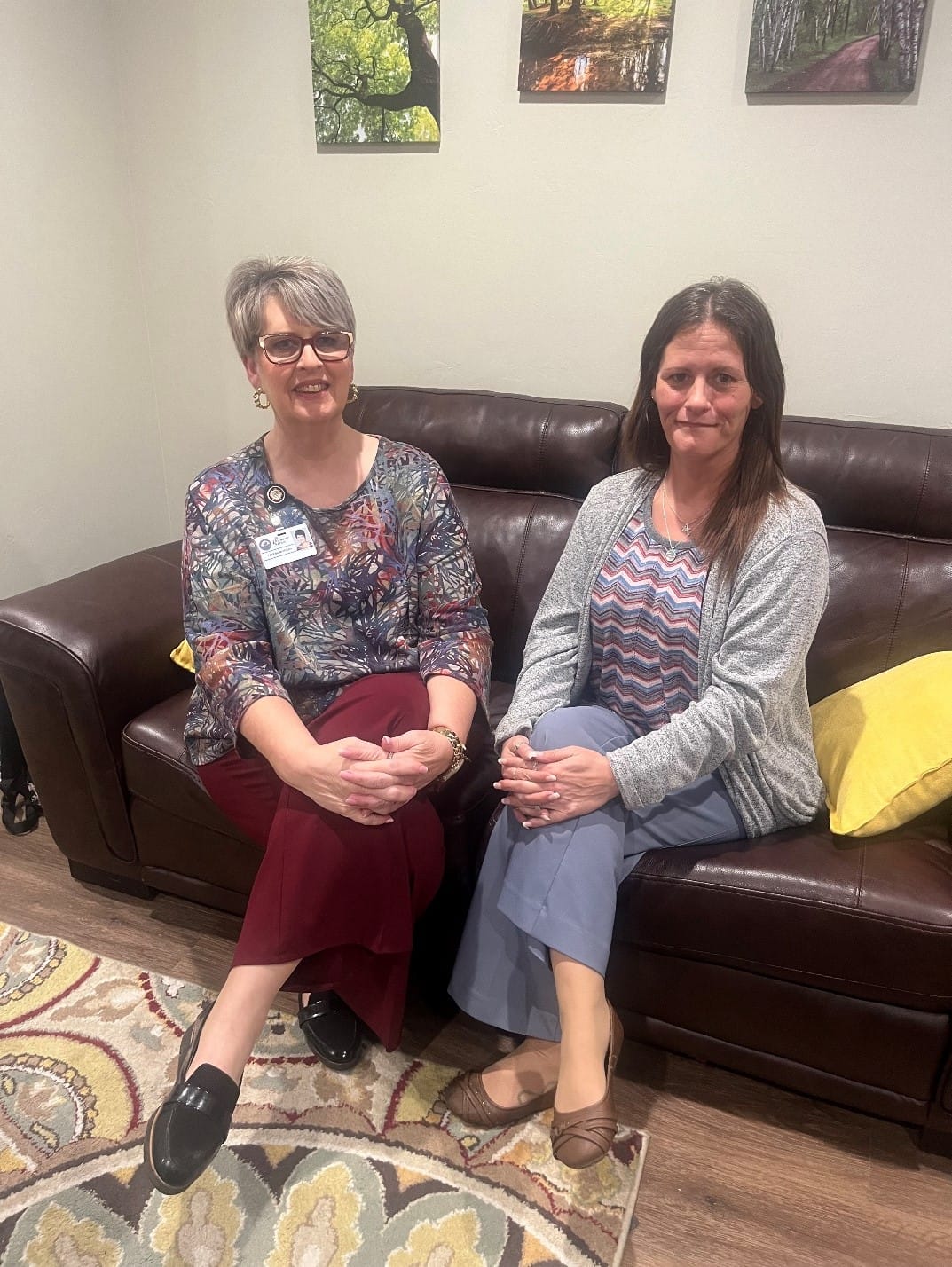
Domestic violence victims can develop a kind of tunnel vision in which they think their situations are unique with no possibility of escape. Chickasaw Nation Director of Violence Prevention Janie Loch wants victims with this mindset to know nothing could be further from the truth.
“One of the most important things we want to communicate to victims of domestic violence is they are not alone. We want them to know services are available and urge them to reach out. It’s not their fault,” Loch said.
October is Domestic Violence Awareness Month and an opportunity for the Chickasaw Nation to alert victims to the many resources offered in their time of need.
The Chickasaw Nation Department of Family Services offers a wide array of services in support of domestic violence prevention and intervention.
“We have wraparound services available for violence prevention,” Loch said. “The biggest part of our program is for victims, but we also conduct a batterers’ intervention program led by Teresa Morgan, our program manager.”
Morgan said the course for batterers is a 52-week, court-ordered program that goes by the acronym OTAP. “OTAP stands for Own violence, take responsibility and Act responsibly Program,” she said.
Morgan said OTAP has seen an impressive success rate with less than 10% falling back into their old habits after completing the program. “It changes their belief system,” she said.
“We see a lot of generational violence where a mother was a victim and the daughter also becomes a victim, and the same with perpetrators,” Loch said. “Through Teresa’s OTAP program we teach them First American cultural values. These are core values the tribe lives by, and we communicate to them that violence is not traditional.”
Loch said it is not just girls and women who are subject to domestic violence.
“The number of men we see is significantly lower because it is so underreported,” she said. “Men are probably less than 5%. Children are approximately 60% with women totaling about 35% of the victims we see.”
The Chickasaw Nation operates a shelter in Ada, Oklahoma, for victims of domestic violence.
“When victims arrive, we review a service plan with them to find out what they want to achieve. We get them employment because often they haven’t been allowed to work outside the home. That, or we get them back into school. Then our navigators find housing for them,” Loch said.
“Once they leave the shelter, our navigators continue to perform home visits to offer continued support for as long as it is needed.”
Loch said Chickasaw Nation Violence Prevention Services are not exclusive to Chickasaws and other First Americans but include non-First American people as well.
“We are open to anyone who calls as long as they are in our service area or are willing to relocate. For Chickasaws, we provide services wherever they are located,” she said.
A candlelight vigil is planned to call attention to Domestic Violence Awareness Month, 6-8 p.m., Thursday, Oct. 23, at the Kathryn P. Boswell Memorial Chapel at East Central University in Ada.
Those needing support for domestic violence can call the Chickasaw Nation Violence Prevention Services office Monday through Friday at (580) 272-5580. For after-hours assistance, victims can call the toll-free hotline at (855) 405-7645.
Those wanting information regarding court cases are asked to call the Chickasaw Nation Crime Victim’s Support Hotline at (833) 774-1601.
“The Chickasaw Nation Crime Victim’s Support Hotline is mainly for people who have a court case and need to know the latest information,” Morgan said. “We help them get what they need as soon as possible.”
For additional information, visit Chickasaw.net/Services/Family/Domestic-Services.
